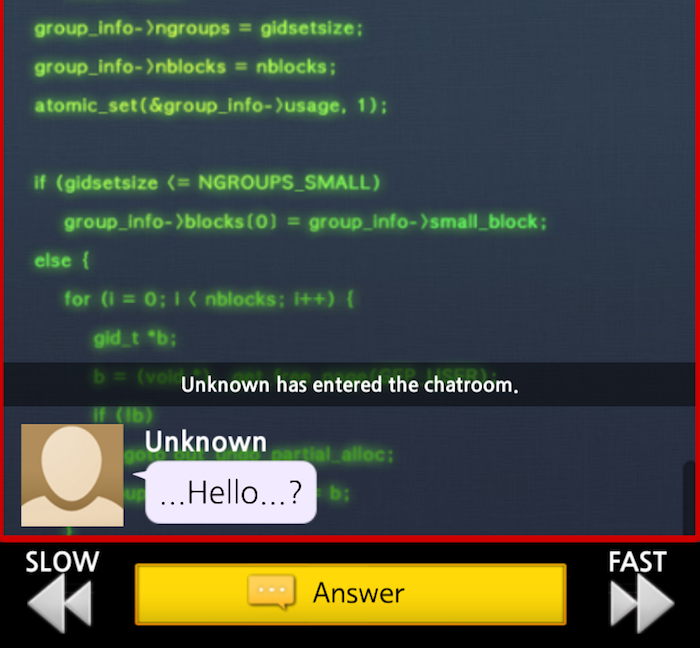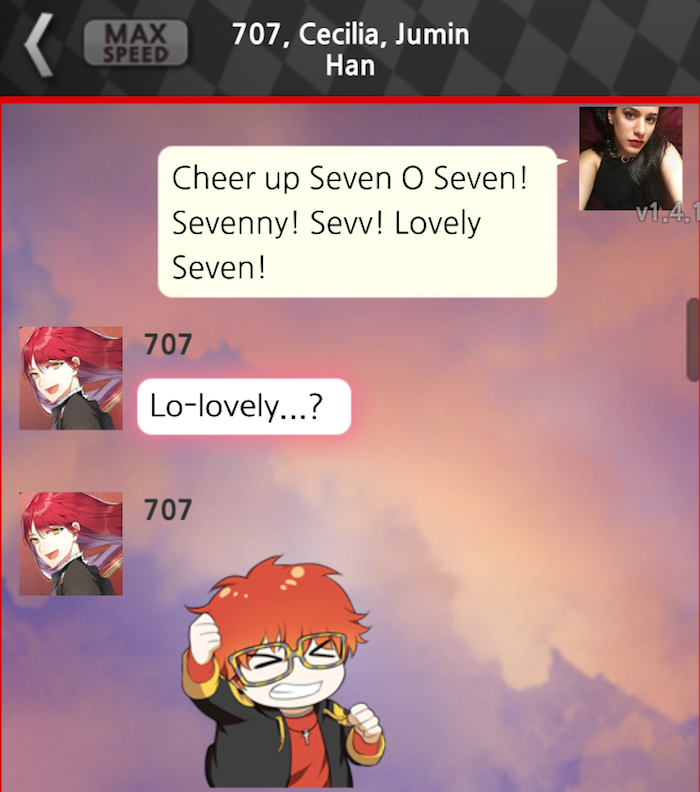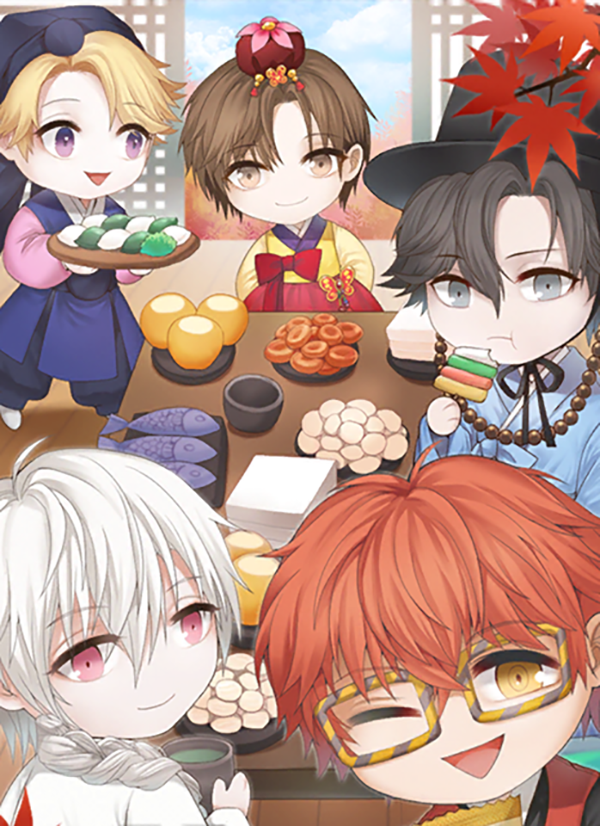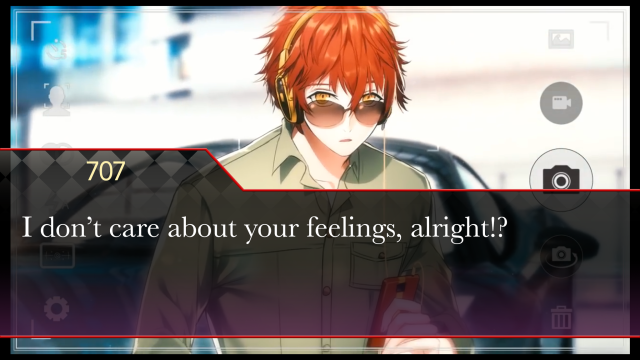The Korean dating simulator Mystic Messenger has become somewhat of a sensation among over a million women worldwide. It’s an “otome” game (literally, “maiden game”) that offers female players a harem of anime boys to court. These suitors are all charming in their own ways and all have their particular emotional needs. And, goddamn, are they needy.
Mystic Messenger
Hovering at around a million downloads on iOS and Android, Mystic Messenger must have a hook, something easily relatable, that appeals to amorous women worldwide. And yet, although it is built for women, Mystic Messenger is not built for what women want as much as it simulates what we begrudgingly deal with. It’s a dating simulator that makes a game out of emotional labour, a type of work that has players fielding others’ emotional needs at the expense of their own.
Mystic Messenger comes from the decades-old otome genre that rides on trends in dating. Critic Amanda Cosmos describes them as “typically narrative-driven social sims marketed to women where the primary objective is to pursue a romantic relationship with a suitor of the player’s choice”. Players are usually cast as a woman who pursues men. Winning is living happily ever after with your chosen lover. Losing, traditionally, happens when you and your lover don’t vibe.
<<SPOILERS AHEAD>>
The plot of Mystic Messenger is instantly compelling: Your in-game character is browsing her smartphone when she accidentally stumbles upon the app, Mystic Messenger. She downloads it and begins chatting with “Unknown”. He leads her to a mysterious apartment, and when she enters, the app grants her access to a chatroom full of delicious men, collectively called the “RFA”. They are planning a benefit party. The woman who used to plan it, the apartment’s previous resident, died. You must take her place and corral guests. Mostly, though, you hang out online with the boys: A stern businessman, a narcissistic actor, a childish “LOLOL” gaming addict, a mysterious photographer and a playful hacker. (There is a woman as well — the businessman’s assistant).

Your dialogue choices propel the game forward, earning you “hearts” on behalf of the men you woo. They dole out hearts when you flatter them or say something in line with their worldview or tastes. Telling them “I don’t exercise, either!” or “You’re such an elite!” and even complimenting a selfie — yes, they send you selfies — earns you kudos. If you don’t elicit enough hearts, you’re confronted with a “bad ending”, or a loss. To avoid that, you must closely pay attention to the emotional needs of the boys. The game’s main mechanic is flattery.
Brilliantly, Mystic Messenger’s plot takes place inside the chat rooms, texts and emails of the secret smartphone app. Its level of immersion is absurd and genius. On my iPhone, I received “push notifications” whenever, say, businessman Jumin Han texted me about his meeting. The multi-character chat occurs in real-time. If you miss a chat, you cannot participate in it unless you spend in-game currency (purchasable with real money). The game, in total, takes 11 days to play, and occurs throughout the entirety of those days.
Each boy has his own writing style or font, again adding to Mystic Messenger’s bid for your heart: “she’scutelol”, “Stop shitting around”, “No way~!” and “It’s seriously bad T__T” all describe separate characters, and subtly indicate how to shape yourself into their emotional confidante. Is he an egomaniac about his looks? A gaming-obsessed crybaby? If you want to win, you must be an eager attendant to their emotional states.
On my first playthrough, I didn’t decide on my paramour until a few days in. I wasn’t ready for full-on virtual anime boy devotion. So, whenever I was given the option to compliment the actor’s hairstyle or the businessman’s sharp-mindedness, I withheld praise in favour of more mild responses. I refused to dole out empty, over-eager flattery, hoping that discernment would pay off. But more importantly, I didn’t want to dump on the businessman’s assistant so he’d feel better about overworking her. I didn’t want to reassure the gaming addict that his obsession was cute. And I especially didn’t want to be an endless ego-booster for a shallow actor. As a result, I didn’t earn enough hearts from any one character and, just four days in, met my end. Really — I died.
On my next go-through, I focused my attention on the red-haired trickster-slash-hacker 707. Supposedly the best hacker in Korea, 707 enjoyed wrapping his friends in elaborate pranks between all-nighters defragging for some intimidating intelligence agency. I was into it. And I wanted to win. For weeks, I assiduously courted him.

There was just one problem. To win, I was forced to choose between calling my love a literal “God” or berating him with lines like, “Stop being ridiculous and just focus on work.” My main channels for success were infuriatingly pandering lines like, “Cheer up Seven O Seven! Sevenny! Sevv! Lovely Seven!”, and “God Seven!! Please enlighten us with your presence!” At one point, I had to play along with a joke “outing” the businessman as gay (He was not gay). I discerned what 707 wanted, which was unwavering idolisation, and doled it out.
This was how he fell in love with me. I became his emotional ashtray. It was my worst-case-scenario dating situation, presented as the female romantic fantasy. Mystic Messenger is a brilliant, brilliant game, but is also emotional labour, gamified.
“Emotional labour” describes the task of managing the feelings of others. In work, emotional labour describes how Starbucks cashiers must smile, or how customer service representatives must remain patient. In interpersonal scenarios, emotional labour is a task frequently relegated to women, who are often considered more sensitive than men. That means going out of their way to send supportive texts, compliment outfits, call a friend after a bad date, listen to someone’s career anxieties or patiently nod their head when a significant other is on an ego trip — and also, “emotional labour” describes the social pressure to do these things.
The term “emotional labour” was coined in 1979 by sociologist Arlie Hochschild in The Managed Heart: Commercialization of Human Feeling. She described is at labour that “requires one to induce or suppress feeling in order to sustain the outward countenance that produces the proper state of mind in others — in this case, the sense of being cared for in a convivial and safe space. This kind of labour calls for a coordination of mind and feeling, and it sometimes draws on a source of self that we honour as deep and integral to our individuality.” And, sometimes, it drains us of “self” entirely.
In “‘Where’s My Cut?’: On Unpaid Emotional Labor“, The Toast writer Jess Zimmerman bemoans how being female has inadvertently forced her into a life of emotional labour:
I’ve fielded hundreds of late-night texts, balanced reassurance with tough love, hammered away at stubborn beliefs, sometimes even taken (shudder) phone calls. I’ve actually been on agony aunt duty for male friends since high school, so if it’s true that it takes 10,000 hours of practice to become an expert at something, counseling bereft dudes may in fact be my only expert skill.
Both men and women need reassurance. But men, Zimmerman argues, tend not to provide it for each other. It can be considered a breach of machismo to break down in another male’s presence. So, emotional labour is, quite often, relegated to women: Girlfriends and female friends. It is time-consuming and often thankless.
This brings me back to otome games. The ideal for games like Mystic Messenger is that women are the masters of their own romantic fantasies, which would in theory free them from the too-real burden of spending time (in this case, several weeks) managing men’s emotions, in turn muffling their own. Otome games are a product of shoujo manga, which, in Japanese staples like Fruits Basket or Ouran High School Host Club and Nana, sees the female protagonist rewarded romantically for her authenticity. Sure, men confide their feelings in the protagonists. But those protagonists’ sense of self is never completely eclipsed. Being herself is what makes her irresistible. This is fantasy. This is the female dating fantasy so showcased in contemporary fiction.

The idea that we want to be cheerleaders for virtual boys’ misguided emotional states strikes me as sad. In fact, I hit another “bad ending” in my pursuit of 707, 10 days in. I was meticulous with my praise, even when I hated the person I had to be for him. (If you court businessman Jumin Han, he will lock you in his apartment so he can admire you.)
Hilariously, Mystic Messenger even seemed conscious of its demand for my emotional labour: Halfway into my affair with the egomaniacal 707, he broke the fourth wall: “What [Jumin Han] said reminded me of this. I want to invite the leader of the Emotional Labor Organisation ‘Only Cry’… I heard that ‘Only Cry’ is super good at knowing exactly what’s troubling you.” I baulked. Of course, I had to invite them. I soon received an email from “Emotion”:
“Hello, customer~I heard that something was troubling you. How can I help you? Sincerely, Cry Only, aiming to provide the best customer service.”
Oh my god, I thought. Is this for real?
As a dating simulator, Mystic Messenger succeeds, but only because, in real life, emotional labour is often relegated to women. As a fantasy dating simulator, Mystic Messenger is a burden, and a sad reminder that, sometimes, being adored is simply about wholeheartedly adoring somebody else. Self-expression in Mystic Messenger is a bad tactic. When you are no longer a conduit for one man’s goals, you lose. I wonder, then, what emotional labour as a gaming strategy says about developers’ idea of female game-players. And what it says about many of us who relate to this game.

Comments